Stop wasting natural resources! Finn Recycling regenerates industrial waste sand for reuse
22.02.2021Did you know that sand is the second most-consumed natural resource in the world after water? Finn Recycling developed a technology that makes it possible to purify, regenerate and recycle industrial waste sand for reuse in foundries, power plants and the building materials industry. The global business potential is in the order of billions. The IPR and patent portfolio built with Kolster is now growing in value as the innovation makes its commercial breakthrough.
“Our goal is to take the recycling of industrial waste sands as far as possible, while saving and replacing valuable natural resources”, says Toni Wesin, founder and CEO of Finn Recycling.
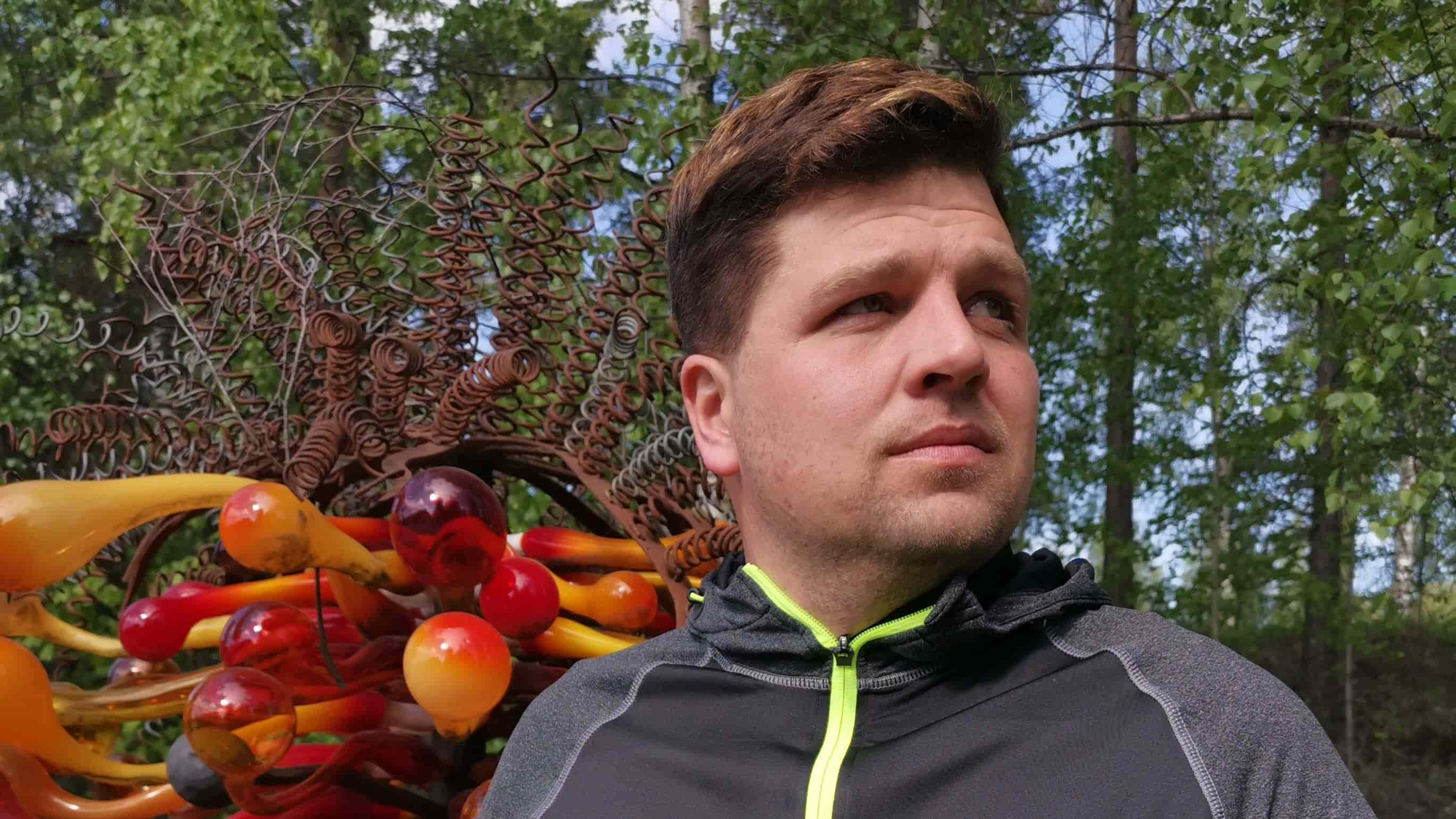
The possibilities are immense. Foundries alone produce 100 million tonnes of waste sand worldwide every year. Foundry waste sand is a major global problem, as it can no longer be used as such anywhere, but is disposed of as hazardous waste in overwhelmed landfills. At the same time, virgin natural sand is in short supply around the world.
“For example, the quartz sand used by foundries in Finland has long been imported from Central Europe. In the future, disposing of waste sand in landfills will no longer be possible either, so purifying and recycling the sand is the only sustainable solution”, Wesin says.
Finn Recycling has developed and patented a unique thermal method and technology for the purification and regeneration of waste sand so that, after treatment, it is equivalent in quality to virgin natural sand. The technology allows foundry waste sand to be regenerated at least ten times and recycled locally and cost-effectively back into the foundry’s own production process. Even after foundry use, it can be further processed into fluidized bed sand for power plants, and still after that, it can be treated again and recycled for utilisation in the building materials industry.
In addition to improving material efficiency, reducing waste, and saving the world’s limited sand resources, the recycling innovation is quite a climate act.
“If the entire Finnish foundry industry switched to thermal regeneration in sand use, we would reduce the carbon dioxide emissions from sand transport alone by more than 3.2 million kilos. On a domestic scale alone, the reduction in CO2 emissions corresponds to the amount that would be generated by driving a car 40 times to the moon and back. Making the lifecycle of a grain of sand pumped from the seabed as long as possible has a huge environmental impact”, Wesin describes.
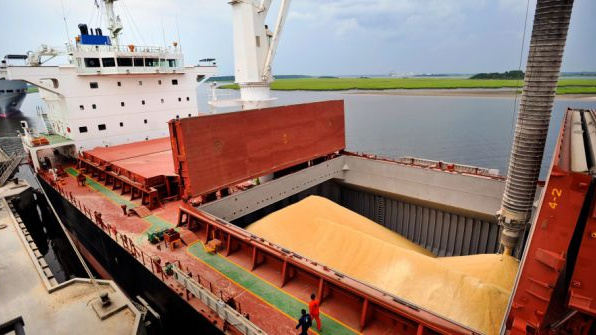
Metals changed to sand, “psychiatrist” to patent attorney
Finn Recycling is on the verge of big things and at the core of the best solutions with its invention, as in the face of fierce competition, industry is under constant pressure to reduce its emissions, use raw materials efficiently and take care of its own waste responsibly.
However, it took several years of maturation time before Toni Wesin realised the global scale and business potential of sand recycling, and before the ideas began to materialise. After that, it took courage to jump into new business.
“When I started talking about the recycling of waste sands at home, my wife was first thinking of referring me to a psychiatrist. She wondered where such thoughts could be coming from”, Wesin says.
Toni Wesin and his parents originally founded the Finn Recycling family business in 2013 for metal recycling. Even before that, Wesin had been working with foundries since 2008 and saw their waste sand problem from up close. Thoughts on the possibilities of recycling the waste sand for reuse began to brew in the metal recycling man’s mind.
The ideas and visions began to materialise quickly when the old Nuutajärvi glass factory went on sale in 2016 at Finn Recycling’s hometown in Urjala. The factory already had old infrastructure and equipment suitable for sand treatment, as quartz sand is also the main raw material for glass. The Wesin family decided to purchase the factory property and boldly kick-start a development project. Seven Finnish foundries joined the project, and Finn Recycling began testing the purification of their waste sands with Aalto University as research partner.
“We succeeded so well already in the first pilot that we then had the courage to start investing more money in further development and actual production.”
However, Wesin had not yet fully realised how unique the expertise that the company had begun to accumulate was.
“When a familiar entrepreneur asked if I had taken care of patents and other IP protection, ‘since you have such a special project going on’, I replied with ‘of what?’. I had not thought about protection at all. At that point, I thought that surely someone else in the world had already come up with something similar.”
However, Wesin decided to find out whether the development results could be patented, and called the patent firm suggested by his entrepreneur friend. Kolster’s European Patent Attorney Ossi Huhtanen began to investigate the matter, and soon gave the green light to filing a patent application.
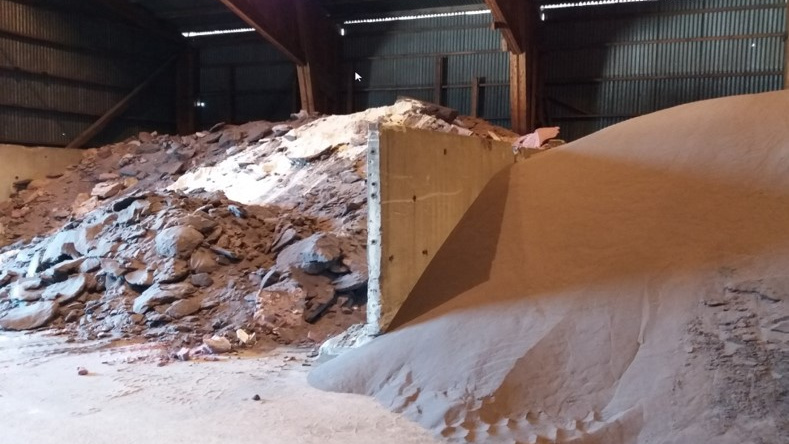
COVID accelerated further development – patents internationalisation
Finn Recycling already holds valuable patent assets for its globally unique sand regeneration innovation, and new patent applications are pending.
The company was able to start commercial deliveries to domestic foundries in 2019. At the same time, it made the largest investment in its history in a new, centralised sand regeneration plant. As production with higher-capacity equipment was launched in early spring 2020, the whole world came to a halt due to the coronavirus pandemic. Finn Recycling was not able to carry out tests and implementations at the facilities of new customers.
The sudden halt in business and the coronavirus crisis eventually turned into a victory through innovation. Finn Recycling applied for and was granted coronavirus subsidies for further development from Business Finland. The result was a new business model and a modular sand reclaimer that foundries can nimbly rent or purchase for their own plant site.
“We refined the thermal regeneration process of the centralised plant and shrunk it to a more compact equipment size to meet the needs of individual foundries. Whereas before we offered a centralised sand recycling service with transport, now the alternative is to use the technology and reclaimer module developed by Finn Recycling that the customer can connect directly to the process of their own production plant”, Wesin says.
Finn Recycling’s centralised-model production plant is now running in three shifts, too, and the most significant foundries in Finland are Finn Recycling’s customers. Recycled sand has been in full production for the longest time span at the Kumera Corporation's Peiron foundry, with good usage experiences since 2018.
The new business model and patent-protected technology have provided a strong start to the company’s internationalisation. Modular sand reclaimers are in production and export markets are opening up. The company already has sales organisations in Sweden, Germany and Italy, as well as a partner in Spain. The market is global, and best of all, the new business model is faster and easier to scale to international business than the centralised plant model.
“Due to high growth targets, we have had to quickly become acquainted with IPR and patent matters as well to ensure the safety of major investments. Without Kolster’s support and expert advice,
we would not have gotten this far. The next goal is to make the investments pay off – and to multiply our turnover in the next few years.”
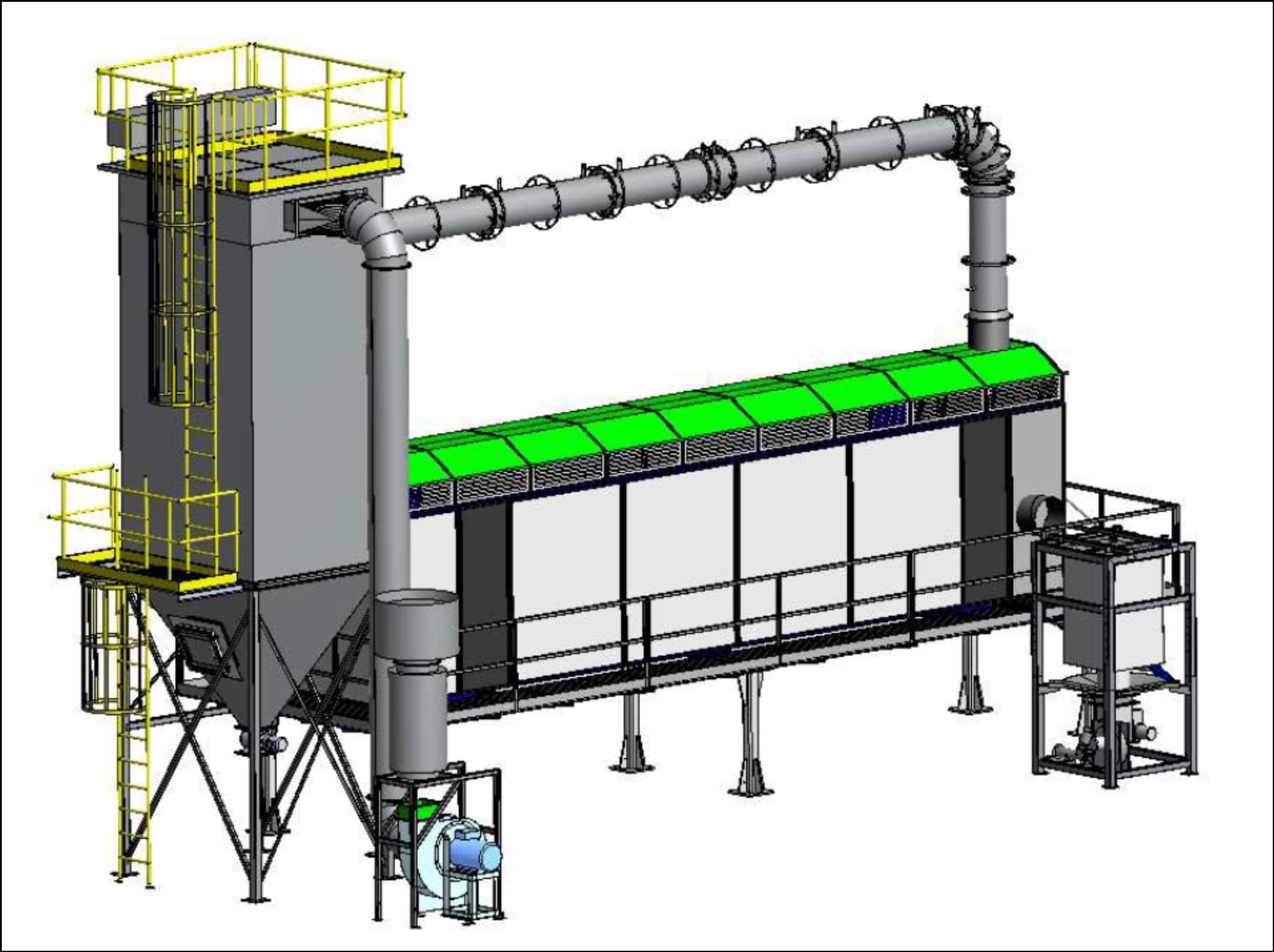
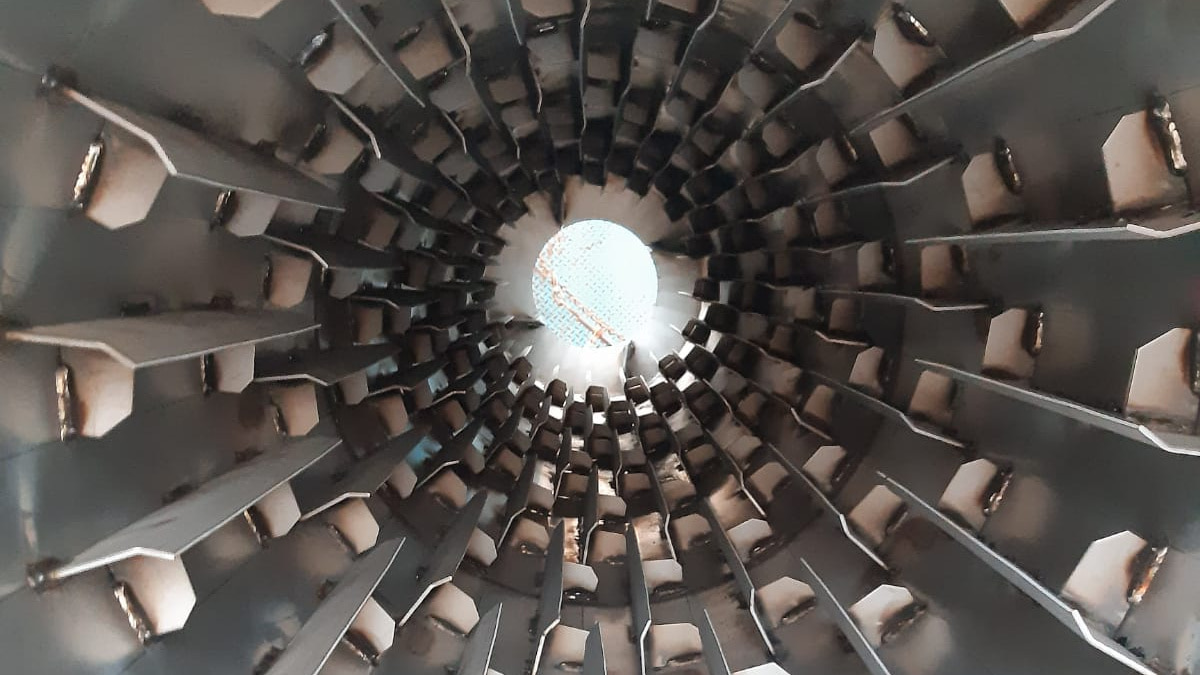
Patent portfolio now growing in value
The collaboration between Finn Recycling and Kolster has intensified into strategic cooperation. In the core team, the international expansion of Finn Recycling’s patent protection and new applications are being handled by Kolster's European Patent Attorney. Other Kolster experts have helped in the consideration of a broader IPR strategy, and recently carried out a valuation of the patent portfolio. It has been important for Finn Recycling to find out the value of its patent assets in the current situation, where all resources, business and the company‘s entire future are 100% devoted to sand recycling.
“Now that we are pushing ahead with the company’s internationalisation, there are significant additional financing needs involved. Valuation of the patent portfolio is one of the things that we can use to show self-sufficiency and growth potential to financiers”, Toni Wesin explains.
The IP valuation confirmed that Finn Recycling holds very significant patent assets.
“It is no longer just about the value of the patents, but also about the overall global market and business potential associated with the patents.”
An in-depth review of the quality and functionality of the patents from the perspective of global business and new application industries carried out in connection with the valuation led to the decision to supplement protection with new patent applications as well. The additional protection will further increase the value of the patent portfolio.
“We would not have been able to consider protection so broadly by ourselves. Kolster provided good observations and further development ideas to ensure that the patent protection is as strong as possible. This kind of discussion and exchange of thoughts has been extremely valuable to us.”
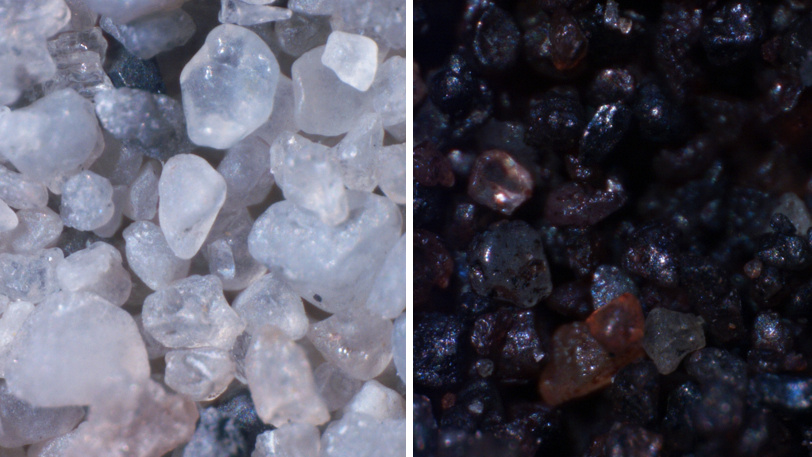
Microscopic images of regenerated and non-regenerated quartz sand
Business to expand into power plant and waterjet sand recycling
Finn Recycling’s patents and pending patent applications already protect about 80% of the market areas in Europe, the United States, China and India that are important to the company and have potential for sand recycling. With protected technology, the international growth potential is huge.
Industrial waste sands are produced most of all in foundries around the world, and almost half of this 100 million tonne mountain is generated in China. The second largest amount of foundry waste sand is generated in India, whose foundry industry, similarly to Finland, relies on imported sand.
“Recycling even just 1% of the world’s foundry waste sand using Finn Recycling’s technology would already be a considerable business”, Wesin says.
After foundries, the second most significant application of recycled sand is in the power plant industry. Around one million tonnes of sand are used every year in European power plants alone. Finn Recycling has further processed and patented a new type of fluidized bed sand suitable for power plant use from regenerated foundry waste sand. The innovation was born when Toni Wesin, who is well acquainted with the needs of the foundry industry, and Finn Recycling’s Sales Manager Jukka Nieminen, who is well acquainted with power plant processes from his previous career, combined their experiences and started brainstorming together.
“With Finn Recycling’s methods, the fluidized bed sand of power plant boilers can still be regenerated once more at the end of its lifecycle and recycled as a raw material for the building materials industry, for use in mortars and fillers, for example”, Jukka Nieminen describes the extremely efficient recycling chain.
During the spring of 2021, Finn Recycling will begin deliveries of regenerated sand to the building materials industry, the first partners being the Finnish Kiilto and the French company Saint-Gobain. Deliveries of fluidized bed sand made from recycled sand to power plants are also starting.
In addition to the recycling of foundry and power plant waste sands, Finn Recycling offers industrial companies a recycling service for abrasive sand used in waterjet cutting. An estimated two to three million tonnes of waterjet abrasives are generated globally every year. They typically contain heavy metal waste that must be removed before the sand can be further recycled for use in the building materials industry.
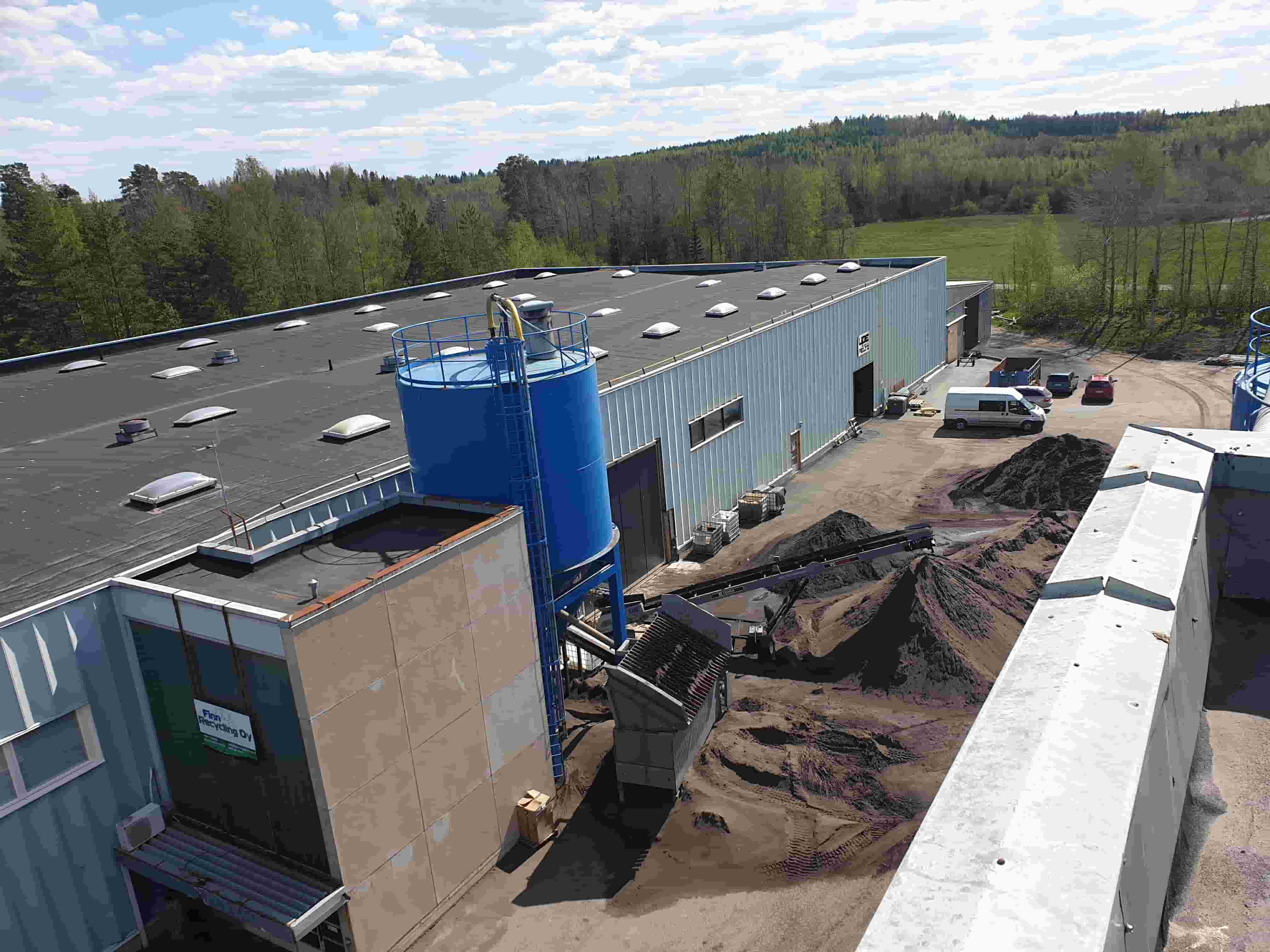
Finn Recycling's centralised sand regeneration plant in Nuutajärvi, Finland
Aiming for a strong brand and EUR 100 million landmark
The large waste sand volumes ensure that there is endless work to be done around the world in the recycling of foundry, power plant and abrasive sands. The environmental impact of sand recycling is also enormous.
“Finn Recycling’s technology makes it possible to recycle once-mined natural sand over and over again for high-value applications, and to replace up to 80–90% of the natural sand currently used by industry every year”, Wesin says.
Finn Recycling now knows how to be proud of its achievements and its unique, patented technology that enables global business.
“Patent matters are already in good shape, and now we are building an international brand and putting trademark things in order. We have been envisioning a suitable product name under which we want to become globally known and grow. Kolster has already carried out preliminary surveys from the perspective of trademark protection and IPR risk management”, Nieminen says.
“We would be very pleased if, within five to six years, we were able to break the EUR 100 million mark in turnover”, Wesin puts the growth targets in concrete terms.
During the acceleration phase of the business, both Nieminen and Wesin value the Kolster cooperation based on value adding discussions above all.
“Along the way, Kolster has always had a good view of what should be done next, and we have obtained several further development ideas for our own business. On the other hand, they have also had the courage to say it if there is no point in moving forward with something.”
